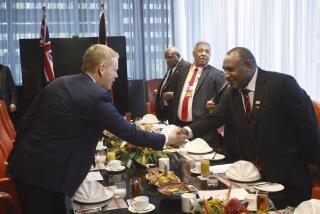Nuclear Deal With Japan Still Hot Issue : Takeshita Visit Fails to Resolve Matter of Deliveries for Reactors
- Share via
WASHINGTON — Japanese Prime Minister Noboru Takeshita concluded a three-day visit to Washington on Friday but left unresolved a brewing controversy over an agreement reached with the Reagan Administration last November to loosen restrictions on the sale of U.S. uranium and plutonium to Japan for use in civilian nuclear reactors.
Former Defense Secretary Caspar W. Weinberger has charged that the nuclear shipments would be vulnerable to terrorists, and both the Senate Foreign Relations and House Foreign Affairs committees have threatened to block the accord unless it is revised.
But President Reagan and Takeshita reiterated their commitment to the accord. Calling it “a good agreement,” Reagan said, “We will exert our best efforts to have it come into force expeditiously.”
Blanket Authorization
Washington and Tokyo concluded the U.S.-Japan Peaceful Nuclear Cooperation Agreement on Nov. 4 after years of negotiation. It would give blanket authorization for air shipment of U.S. nuclear fuels to Japan for the next 30 years. Laws now in effect require each such shipment to be approved separately.
Japan, which is expanding nuclear power generation to reduce its reliance on imported oil, has pressed the United States to ease its access to nuclear fuels, contending that the continual process of seeking individual authorizations was causing unnecessary delays and aggravation. For its part, the Administration was eager to prove itself a reliable supplier of critical materials to key allies and to maintain its influence over countries with large nuclear power complexes.
The agreement would boost the volume of nuclear fuels Japan buys from the United States. By the year 2000, Japan is expected to have purchased a total of 85 tons, substantially more than it has on hand now, officials said.
Plutonium Thefts Feared
The U.S. Nuclear Regulatory Commission, which has declared its opposition to the accord, has charged that inadequate safeguards at Japanese nuclear plants could result in unaccountable losses of “hundreds of kilograms of plutonium” per year. About seven kilograms falling into the wrong hands could be used to produce a crude nuclear weapon, experts say.
Adding to opponents’ concerns are reports that no containers now exist that can assure safety of the highly radioactive plutonium in an accident. Containers tested by U.S. laboratories have not passed simulated crash tests, and medical experts say that one planeload could cause countless cases of cancer if there were widespread exposure.
Weinberger stated his opposition to the accord in an April, 1987, letter to President Reagan, and in December majorities of the Senate and House committees threatened to enact legislation to block it, contending that it does not conform to U.S. laws restricting the spread of materials that could be used in nuclear weapons.
In letters to Reagan last month, 15 senators and 23 members of the House demanded that the Administration seek further safeguards from Japan and then resubmit the agreement.
However, the Administration has shown no inclination to relent. Under law, the accord will automatically take effect in February--90 days after its initial approval--unless Congress blocks it.
Congressional opponents also have demanded a copy of Weinberger’s letter to the President detailing the Pentagon’s reasons for opposing the agreement. The White House has refused the request.
Frank C. Carlucci, who succeeded Weinberger as defense secretary in November, met with Takeshita on Friday and is said to believe the current agreement is adequate. Takeshita later left for Toronto, where he opened meetings with Canadian Prime Minister Brian Mulroney.
More to Read
Sign up for Essential California
The most important California stories and recommendations in your inbox every morning.
You may occasionally receive promotional content from the Los Angeles Times.











